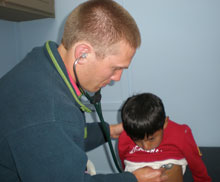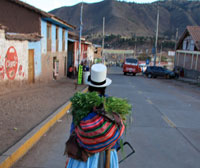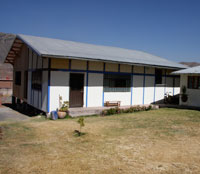Medical Student Enrichment Program Opens Doors and Minds
By Jo Lynn Orr
 |
Frank B. "Will" Williams examines a patient in a two-room clinic in Peru. Williams says participating in MSEP helped shape his views on poverty. |
Becoming a physician involves accepting challenges. For some UAB School of Medicine students, however, the Medical Student Enrichment Program (MSEP) enables them to go thousands of miles beyond their comfort zone—to Latin America, Asia, and Africa.
Supported by the Medical Alumni Association and the Caduceus Club, the MSEP fosters humanitarian attitudes and cross-cultural understanding among future physicians through international research or patient interactions. Kathleen Nelson, M.D., senior associate dean of faculty development, founded the summer program in 1995 to encourage students to take an interest in underserved populations, learn about global medicine, be resourceful, and hone their problem-solving, observation, and communication skills.
Expect the Unexpected
Laura Kezar, M.D., associate dean for students and current MSEP director, says the program provides students with the opportunity to stretch themselves and open their minds to learning so that they can become better doctors. However, she says, students also should be “open to the fact that what they get from the experience may not be what they expected.”
 |
"The big thing I learned is how much infrastructure issues factor into health care and how those combine to limit people’s opportunities for success,” Williams says. |
MSEP participant Frank B. “Will” Williams got such a surprise in the summer of 2008. After his first year of medical school, he chose to go to San Jeronimo, Peru, to work in a two-room clinic built by an American physician who was part of a missionary organization.
“My experiences in Peru revised my perceived framework of what it means to be a physician and what health care means,” he says. They also shifted his perspective on poverty. Seeing firsthand the stark reality of daily life for people living in an underdeveloped country, Williams realized that “telling someone to wash their hands doesn’t really make sense if they don’t have access to clean water. The big thing I learned is how much infrastructure issues factor into health care and how those combine to limit people’s opportunities for success.”
Expanding Horizons
After returning from Peru, Williams enrolled in the M.D./M.P.H. program offered by UAB’s schools of Medicine and Public Health. He wants to specialize in obstetrics/gynecology “because I believe it’s a field where I can make a difference,” he says. “I want to work with a poor population and do my part to address health inequities.”
 |
Participants in MSEP leave modern hospitals to work in often poverty-stricken areas where basic buildings can serve as all-purpose health-care facilities. |
This year, more than 20 students applied to the MSEP, Kezar says, and about 10 to 15 will go overseas this summer. An advisory committee of faculty and MSEP/School of Medicine alumni helps select students for the program and assists them in preparing for their travels. The students decide where they want to go and what they want to do there; the committee reviews each overseas program and tries to make sure it matches up well with each student.
The students spend at least four weeks out of the country, and when they come back, “they don’t talk about what they gave; they talk about what they got from the experience,” Kezar says. She finds it particularly gratifying to see so many students willing to expand their horizons in their quest to become physicians. “Although many medical students today have traveled extensively, we still had six students this year who had never traveled outside the United States, and some who hadn’t traveled outside the Southeast. Those are the students who really have the potential for personal growth.”
— This story originally appeared in Informal Rounds, the newsletter of the Medical Alumni Association of the School of Medicine at UAB.